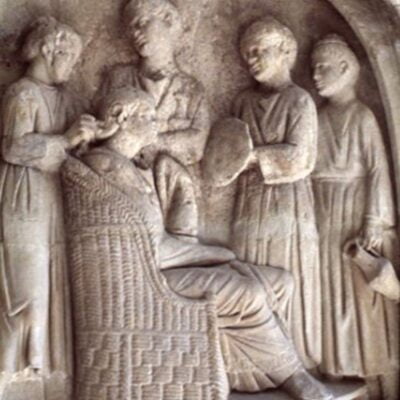The beginnings of the history of fragrances probably go back to the very distant history of mankind, so distant that it is impossible to determine it today. Perhaps one of our distant ancestors noticed that a resinous branch emits a pleasant smell when burned. The documented history of fragrance begins with the existence of great ancient civilizations – Egyptians, Jews, Assyrians, Greeks, Romans, and Chinese, all used perfumes in their own often sophisticated ways. In ancient times, plant oils and incense, i.e. mixtures of strong-smelling resins, were used as perfumes. Burning aromatic resins or incense gave a pleasant smell, hence the origin of the word perfume, from the Latin per fumum meaning “through smoke”.
One of the incense was olibanum, made on the basis of aromatic resin, used as a fragrance, but also as a perfume. In ancient times, olibanum was highly valued, and the best were supposedly imported from the area of present-day Oman, Yemen and Somalia.
The Romans, initially a simple nation of the land of soldiers, enthusiastically discovered, under the influence of Greece and the Orient, a fashion for life tempting with pleasures, of which the smell was one of the most important. The essence of expensive saffron was a favourite, and various perfumes were used to perfume almost everything that was at hand, including wine. The Roman aristocracy invented complicated rules for perfuming the body: mint for the hands, palm oil for the beard and breast, marjoram for the eyebrows and hair, and the essence of crushed thyme for the knees and shoulders. Wealthy Romans loved to surround themselves with beautiful objects.
They attached great importance not only to their appearance but also to their smell. Their chambers were permeated with the smell of flower petals, and the mattresses in the huge beds on which they slept were stuffed with rose petals. To neutralize the oppressive weight of the sultry summer in Rome and to get rid of the unpleasant odours of packed amphitheatres, during sports competitions and theatrical performances, fountains in and around theatres sprayed perfumed water. Even an ordinary citizen smeared not only himself but also his horses and dogs with fragrant oils three times a day on average. Emperor Nero had the floors in every chamber of his golden palace covered with a thick layer of rose petals. During receptions in the formal dining room, fragrant flowers flowed continuously from the ceiling, and scented water gushed discreetly from silver tubes. The discovery of the method of glass production in the 1st century BC. and its use in the manufacture of bottles and boxes for fragrant substances was one of the most important inventions of the Roman Empire.
In the life of the aristocracy and the imperial family, pleasant smells were ubiquitous. The ruler often had his bed stuffed with rose petals. The Romans perfumed themselves (each part of the body with a different scent), clothes, objects and animals and did it even three times a day!
When, with the beginning of the fall of the Roman Empire and the advent of Christianity, which forbade the use of perfumes due to their supposed sensual effects, knowledge of perfumes largely disappeared in Europe. It took the Crusades to the Holy Land in the 11th-13th centuries for Europe to regain the lost joy of perfume and rediscover what soap is for.








